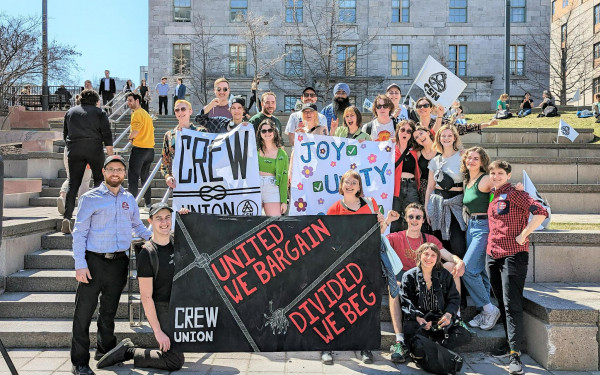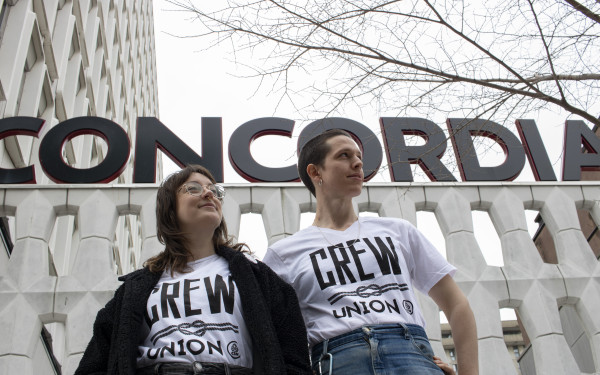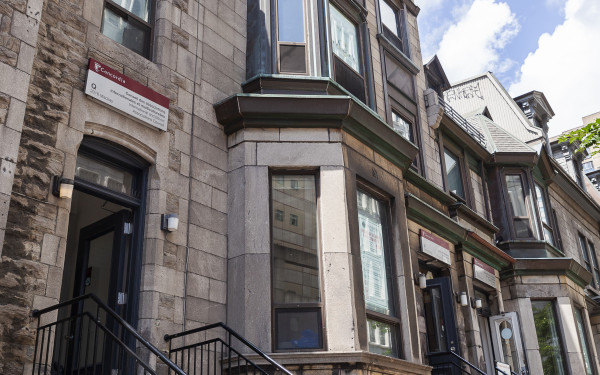Teaching and Research Assistants Rally for a Contract
Negotiations Ongoing Between Concordia and TRAC Union
Despite an outside temperature of minus-16 degrees Celsius, Concordia teaching and research assistants assembled Monday morning to voice their concerns as negotiations for a new collective agreement continued between their union—Teaching and Research Assistants at Concordia—and the university.
“One, two, three, four, we know what we’re here for! Five, six, seven, eight, Concordia, negotiate!” union members chanted in front of the EV building on Ste. Catherine St.
“There’s this sense of invisible labour with teaching assistants, which has to do with the fact that we’re treated as students rather than workers,” TRAC communication and mobilization officer Dominic Leppla told The Link. “Being on the street and being visible is one way to make people understand.”
At the previous bargaining session on Feb. 11, Concordia negotiators refused to meet TRAC’s demands for higher pay. Union members at TRAC’s general assembly on Feb. 13 were told the major reason for the university’s stance is a clause in other union agreements, which requires Concordia to increase the pay for each union by the same amount if a single union receives a pay increase of over two per cent.
TRAC president Adam Szymanski said the rally would draw attention to “the gross discrepancies in pay between Concordia and other universities in Montreal.”
“Many Concordia TAs are paid a dollar and a half over minimum wage, while our colleagues at other Montreal universities make over 60 per cent more,” reads TRAC’s website.
Union members met at TRAC’s offices to gather placards before heading to the official meeting point next to the EV building at 8:30 a.m. Szymanski and TRAC bargaining officer Erik Chevrier spoke to the union members present at the rally before being escorted by chanting demonstrators to the FB building, where a bargaining session was set to take place.
The demonstrators, who numbered around 50, then walked down Guy St. to the entrance of the GM building on de Maisonneuve Blvd. They attempted to walk inside but were denied entry by members of campus security, who said that the wooden sticks holding the demonstrators’ posters were a safety risk.
Returning to their meeting point, TRAC members then chanted, “What do we want? Contract! When do we want it? Now!” before dispersing at 9 a.m. due to the cold weather.
A TA who wished to remain anonymous contacted The Link about the repercussions of insufficient pay.
“We are not paid for very many hours, which means we need to rush to correct papers that students took a lot of careful time and effort to write,” the TA said.
Leppla said he expects Concordia’s bargaining team to take the contract negotiations more seriously after the demonstration.
“What we’re told again and again [by the administration] is, ‘Oh, the people are angry? The engineers are angry? We don’t know that, we don’t see that,’” he explained. “So part of the purpose of being out today is to show them [this dissatisfaction] does exist.”
“It’s more of an issue of raising awareness to the rest of the community at Concordia,” added A.J. Cordero, a TA in the journalism department. “I’m sure down the road, maybe in a year’s time, we’ll get a new agreement that reflects the [union pay] landscape in Canada. But for now I don’t see the university administration [meeting our demands].”
According to Szymanski, the protester’s demands, if left unmet, could very well lead to more drastic measures.
“Following on our general assembly’s unanimous decision to make a mobilization and strike committee at our last meeting, I suspect that the membership will want to give the bargaining committee a strike mandate if Concordia’s administration continues to deny TAs and RAs a fair and honest contract,” he said.
University policy is to not comment on collective bargaining, but after the last bargaining session Concordia spokesperson Chris Mota said negotiators were “working diligently to reach an agreement.”
“We’re out here not to cause trouble, just making things visible and present and I think we’ve made it clear today that we’re a union and we want to be treated as such,” said Leppla.
“If we’re not given things, there will be consequences. This is a demonstration to show to Concordia that we mean business. We’re not going to accept a contract which is not fair.

_900_600_90.jpg)
_900_643_90.jpg)
_900_597_90.jpg)

_600_375_90_s_c1.jpg)


